German Shorthaired Pointer Dog
- January 31, 2024
- 0 comment
The German Shorthaired Pointer, often referred to as the GSP, is a remarkable and versatile breed of dog known for its intelligence, athleticism, and friendly disposition. Originating in Germany in the 19th century, GSPs were originally bred as hunting dogs, specifically for pointing and retrieving game birds. They are characterized by their medium to large build, short and dense coat, and distinctive liver or liver and white coloring.
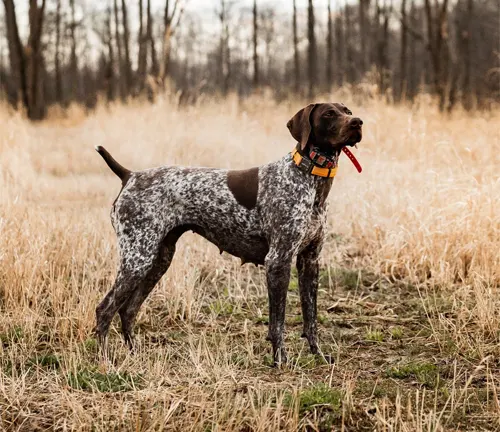
GSPs are not only skilled hunters but also excel in various dog sports and activities, from agility to obedience trials. Their adaptability and quick learning abilities make them a favorite choice among dog enthusiasts seeking versatile and loyal companions. Beyond their hunting prowess, GSPs make excellent family pets when properly socialized. They are known for their affectionate nature, forming strong bonds with their owners and getting along well with children and other pets.
However, it’s important to note that GSPs are high-energy dogs that require regular exercise and mental stimulation to stay happy and healthy. They also benefit from consistent and positive reinforcement-based training methods. While they may have a strong hunting instinct, with proper training and socialization, GSPs can thrive in a variety of environments, from rural to suburban settings.
| Characteristic | Description |
|---|---|
| Size | Medium to large |
| Height | 21 to 25 inches at the shoulder |
| Weight | 45 to 70 pounds |
| Coat | Short, dense, and water-resistant |
| Coat Colors | Liver, liver and white, black and white (variations) |
| Ears | Moderately long, floppy |
| Tail | Usually docked, thick at the base |
| Eyes | Medium-sized, almond-shaped, typically brown |
| Lifespan | 10 to 14 years |
| Temperament | Friendly, intelligent, affectionate |
| Energy Level | High |
| Exercise Needs | 1-2 hours of daily exercise and mental stimulation |
| Training | Responsive to positive reinforcement training |
| Socialization | Early and thorough socialization is crucial |
| Health Concerns | Hip dysplasia, bloat, allergies, hypothyroidism, epilepsy |
| Grooming | Low-maintenance, regular brushing and ear cleaning |
| Compatibility | Good with children and other pets when socialized |
| Watchdog Ability | Alert, may bark to alert owners to potential threats |
| Ideal Living Environment | Access to a yard or outdoor space, active households |
| Best Suited For | Active individuals and families willing to provide exercise and mental stimulation |
A Versatile Breed of Dog

German Shorthaired Pointers, often abbreviated as GSPs, are a remarkable breed of dog that has gained popularity for their versatility, intelligence, and affectionate nature. In this article, we will explore the fascinating world of German Shorthaired Pointers, covering their history, physical characteristics, temperament, training needs, and more. Whether you’re considering adding a GSP to your family or simply curious about this breed, read on to discover what makes them so special.
History and Origin of German Shorthaired Pointers
The history of German Shorthaired Pointers can be traced back to 19th century Germany. They were originally bred for hunting purposes, with a focus on creating a dog that could excel in both pointing and retrieving game birds. German breeders crossed various breeds like the English Pointer, German Bird Dog, and the Spanish Pointer to develop the GSP we know today.
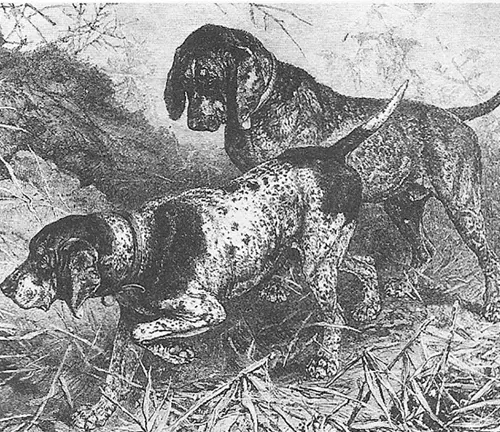
Physical Characteristics
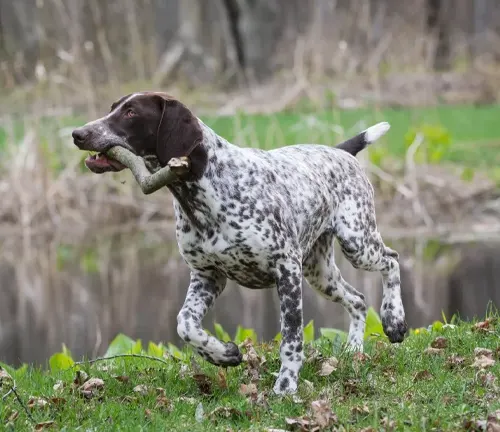

- Size: GSPs are medium to large-sized dogs. They typically stand between 21 to 25 inches (53 to 64 cm) tall at the shoulder and weigh between 45 to 70 pounds (20 to 32 kg). Their size contributes to their strength and agility.
- Coat: German Shorthaired Pointers have a short, dense, and sleek coat that is water-resistant. The coat is easy to maintain and comes in various color combinations, with liver or liver and white being common. Their coat is well-suited for outdoor activities and hunting.
- Ears: GSPs have moderately long, floppy ears that hang close to their head. These ears help them in scent tracking and hunting, as they can capture and funnel scents towards their nose.
- Tail: Their tail is commonly docked, meaning it is shortened to a certain length, although it’s not always done. When undocked, GSPs have a long, tapered tail that is thick at the base and tapers towards the tip. It is typically held horizontally or slightly upwards.
- Eyes: GSPs have expressive and intelligent-looking eyes. They are medium-sized, almond-shaped, and usually brown. Their eyes convey their alertness and enthusiasm, making them great hunting companions.
Temperament and Personality
One of the standout features of German Shorthaired Pointers is their friendly and intelligent nature. They are loyal, eager to please, and make excellent family companions. Their high energy levels make them great for active households, but they also have a calm and loving side when indoors.
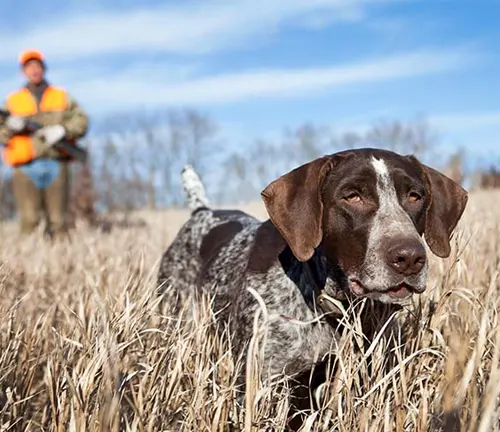

- Friendly and Affectionate: GSPs are known for their friendly and affectionate nature. They are loving and loyal companions who form strong bonds with their owners and families. They thrive on human interaction and are often described as “velcro dogs” because they like to be close to their people.
- Intelligent and Eager to Please: German Shorthaired Pointers are highly intelligent dogs. They are quick learners and are eager to please their owners, which makes them relatively easy to train. Their intelligence also makes them versatile in various activities and dog sports.
- High Energy Levels: GSPs are full of energy and enthusiasm. They have a lot of stamina and require regular exercise and mental stimulation to stay happy and healthy. Their high energy levels make them well-suited for active individuals or families who enjoy outdoor activities.
- Alert and Watchful: These dogs are naturally alert and watchful, making them excellent watchdogs. They are quick to detect any changes in their environment and will often bark to alert their owners to potential threats or visitors.
- Versatile and Adaptable: German Shorthaired Pointers are known for their versatility. They excel in various roles, including hunting, dog sports, and being family pets. Their adaptability and willingness to take on different tasks make them a favorite choice among dog enthusiasts.
The Versatility of GSPs

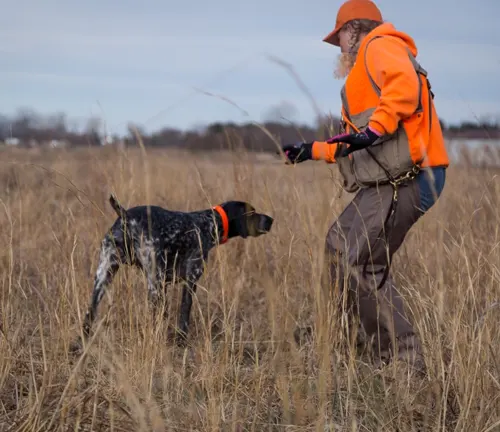
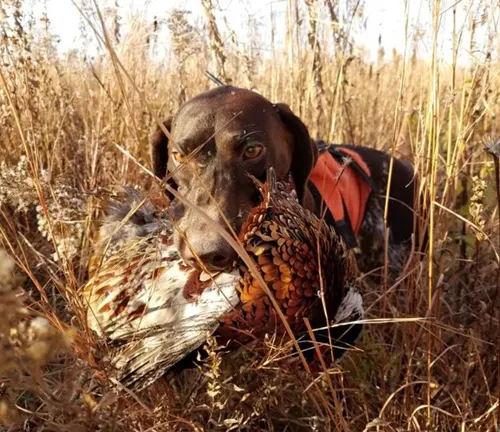
The versatility of German Shorthaired Pointers (GSPs) is one of their standout characteristics. These dogs are known for their ability to excel in various roles and activities. Here are some aspects of their versatility:
- Hunting: GSPs were originally bred for hunting, and they are exceptional hunting dogs. They have a keen sense of smell and are skilled in pointing, retrieving, and tracking game birds. Their versatility in different hunting scenarios, such as upland and waterfowl hunting, makes them a popular choice among hunters.
- Dog Sports: GSPs thrive in various dog sports and competitions. They can participate in activities like agility, obedience trials, field trials, and dock diving. Their athleticism, intelligence, and eagerness to learn make them competitive in these events.
- Search and Rescue: German Shorthaired Pointers are often employed in search and rescue missions. Their excellent scenting abilities and endurance make them valuable assets in locating missing persons or providing assistance during emergencies.
- Therapy and Service Dogs: Some GSPs are trained to be therapy or service dogs. Their friendly and affectionate nature, combined with their intelligence and trainability, allows them to assist individuals with disabilities or provide comfort in therapeutic settings.
- Companion Animals: Beyond their working roles, GSPs make wonderful family pets and companions. Their affectionate and loyal nature ensures they form strong bonds with their owners. They can adapt to various living environments, from suburban homes to rural settings, as long as they receive adequate exercise and mental stimulation.
- Hiking and Outdoor Activities: Due to their high energy levels and endurance, GSPs are excellent hiking and outdoor adventure companions. They thrive on physical activity and enjoy exploring the great outdoors with their owners.
- Agility and Problem Solving: Their intelligence and problem-solving skills enable GSPs to excel in agility courses and interactive puzzle toys. They love challenges and can quickly learn new tasks and tricks.
GSPs as Family Dogs
While they have a strong hunting instinct, GSPs can be wonderful family dogs when properly socialized. They get along well with children and other pets, forming strong bonds within the family. Their protective nature can make them excellent watchdogs as well.

Training and Socialization


- Early Socialization: Socialization is crucial for GSPs from an early age. Expose them to various people, animals, and environments to help them develop into well-adjusted and confident adults. Early socialization reduces the likelihood of fearfulness or aggression towards new experiences.
- Positive Reinforcement: GSPs respond best to positive reinforcement training methods. Use treats, praise, and rewards to reinforce good behavior. Avoid harsh punishments or negative reinforcement, as it can lead to anxiety or reluctance to learn.
- Consistency and Structure: Establish consistent rules and routines in your training. GSPs thrive in structured environments where they know what to expect. Consistency helps them understand what is expected of them and reduces confusion.
- Obedience Training: Basic obedience training is essential for GSPs. Teach commands like sit, stay, come, and heel. This not only ensures their safety but also makes them well-behaved companions in various situations.
- Exercise and Mental Stimulation: GSPs require both physical and mental exercise. Incorporate interactive games, puzzle toys, and mentally stimulating activities into their daily routine. A tired GSP is more likely to be attentive during training sessions.
- Leash Training: Proper leash training is crucial due to their strong prey drive. GSPs may be prone to chasing after small animals when not properly leash-trained. Teach them to walk on a leash without pulling.
- Socializing with Other Dogs: Ensure your GSP interacts with other dogs regularly. This helps them learn appropriate canine social skills and prevents aggressive behavior towards other dogs.
- Desensitization to Stimuli: GSPs can be sensitive to certain stimuli, such as loud noises or unfamiliar objects. Gradually expose them to these triggers in a controlled and positive manner to reduce anxiety.
- Recall Training: Due to their hunting instincts, GSPs may be prone to chasing wildlife. Invest time in recall training to ensure they come back to you when called, even in distracting environments.
- Patience and Persistence: Training a GSP can be challenging at times, especially due to their high energy levels and independence. Be patient and persistent in your training efforts, and don’t get discouraged by setbacks.
Common Health Concerns
Like all breeds, GSPs are prone to certain health issues, including hip dysplasia, bloat, and certain skin conditions. Regular check-ups with a veterinarian and a balanced diet are important to maintain their well-being.
Hip Dysplasia: Hip dysplasia is a genetic condition where the hip joint doesn’t develop properly, leading to arthritis and pain. It can affect GSPs, especially as they age. Regular vet check-ups and maintaining a healthy weight can help manage this condition.
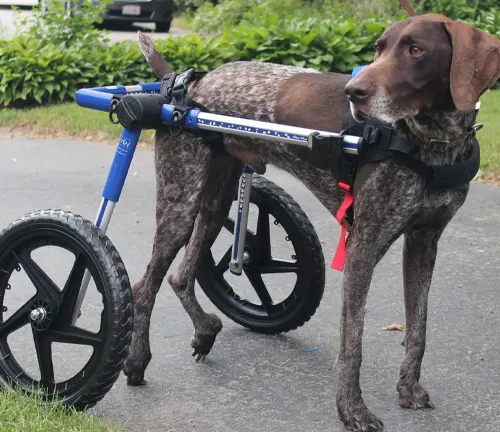
Bloat (Gastric Dilatation-Volvulus): GSPs, like other deep-chested breeds, are susceptible to bloat, a life-threatening condition where the stomach fills with gas and twists on itself. Immediate veterinary intervention is crucial if you suspect bloat, as it can be fatal without treatment.

Allergies: GSPs can develop allergies to environmental factors like pollen or food ingredients. Allergic reactions may manifest as skin irritations, itching, ear infections, or digestive issues. Identifying and managing allergens through a vet’s guidance is important.
Hypothyroidism: Hypothyroidism is a hormonal disorder that can affect GSPs. It occurs when the thyroid gland doesn’t produce enough thyroid hormones. Symptoms may include weight gain, lethargy, and skin problems. Treatment typically involves lifelong medication.
Epilepsy: Epilepsy is a neurological disorder that can lead to seizures in GSPs. While it is more common in some lines of the breed, it can affect any GSP. Medication can often help control and manage epileptic seizures, but it requires ongoing monitoring and care.

Different Species
German Shorthaired Pointers (GSPs) are a distinct and recognized breed, so they do not have different “species.” However, within the breed, there can be variations in coat color and markings.
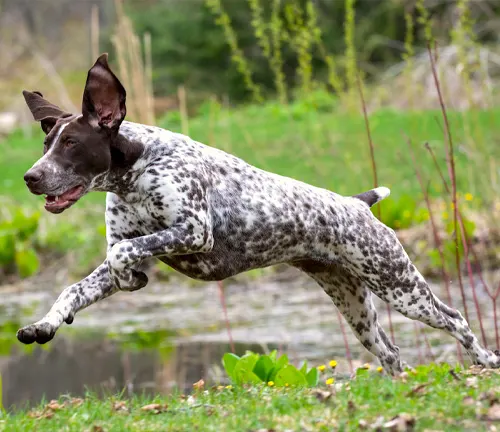
Frequently Asked Question (FAQs)
- What is the average lifespan of a German Shorthaired Pointer?
The average lifespan of a German Shorthaired Pointer is typically between 10 to 14 years with proper care and a healthy lifestyle. - Are German Shorthaired Pointers good with children?
Yes, GSPs are generally good with children. They are affectionate and often form strong bonds with family members, including kids. However, early socialization is essential to ensure a positive relationship between GSPs and children. - How often should I exercise my GSP?
GSPs are high-energy dogs and require daily exercise. Aim for at least 1-2 hours of physical activity, which can include walks, runs, playtime, and mental stimulation. - Do they require a lot of grooming?
No, GSPs have short coats that are relatively low-maintenance. Regular brushing to remove loose hair and occasional ear cleaning and nail trimming are usually sufficient. - Where can I find reputable GSP breeders?
You can find reputable GSP breeders through breed clubs, referrals from other GSP owners, or by conducting thorough research online. Make sure to choose a breeder who prioritizes the health and well-being of the puppies. - Do GSPs make good apartment dogs?
GSPs are better suited to homes with access to a yard or outdoor space due to their high energy levels. While they can adapt to apartment living with sufficient exercise, they thrive in more spacious environments. - Are German Shorthaired Pointers easy to train?
Yes, GSPs are generally easy to train. They are intelligent, eager to please, and respond well to positive reinforcement training methods. - What is the origin of the German Shorthaired Pointer breed?
German Shorthaired Pointers originated in 19th century Germany. They were bred for hunting purposes, particularly for pointing and retrieving game birds. - Do they get along well with other pets, such as cats?
GSPs can get along well with other pets, including cats, when properly socialized from an early age. However, their hunting instinct may lead them to chase smaller animals. - What is their typical energy level?
GSPs have a high energy level and are known for their enthusiasm and stamina. They require regular exercise to remain happy and healthy. - Are GSPs prone to any specific health issues?
GSPs may be prone to health issues like hip dysplasia, bloat, allergies, hypothyroidism, and epilepsy. Regular veterinary check-ups are essential to monitor their health. - Do they bark a lot and make good watchdogs?
GSPs are alert and may bark to alert their owners to potential threats or visitors, but they are not known for excessive barking. They can make good watchdogs due to their watchful nature. - Can GSPs live in hot or cold climates?
GSPs can adapt to various climates, but they should be provided with appropriate shelter and protection from extreme heat or cold. They are better suited to temperate climates. - Are they prone to separation anxiety?
GSPs can develop separation anxiety if left alone for extended periods. They thrive on human interaction, so it’s important to provide mental stimulation and companionship. - What kind of diet is best for a German Shorthaired Pointer?
A balanced diet that meets their nutritional needs is important. Consult with a veterinarian to determine the best diet for your GSP, whether it’s commercial dog food or a home-cooked diet. - How much socialization do GSP puppies need?
GSP puppies require extensive socialization to ensure they are well-adjusted and confident. Expose them to various people, animals, and environments from an early age. - Are GSPs good for first-time dog owners?
GSPs can be a good choice for first-time dog owners who are committed to providing proper training, exercise, and socialization. However, their high energy levels may require more dedication in terms of exercise. - Do they require a fenced yard for safety?
Having a fenced yard is ideal for GSPs, as it provides a safe space for them to play and exercise. They have a strong prey drive, and a fence helps prevent them from chasing wildlife. - What is the history of GSPs as hunting dogs?
GSPs were originally bred in Germany for hunting purposes, with a focus on pointing and retrieving game birds. They are versatile hunting dogs known for their tracking and retrieving abilities. - Can GSPs be left alone for long periods of time?
GSPs may not do well when left alone for extended periods. They thrive on human companionship and can become anxious or develop behavioral issues if left alone for too long. It’s best to provide them with regular interaction and stimulation.








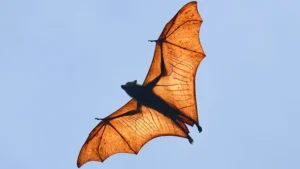


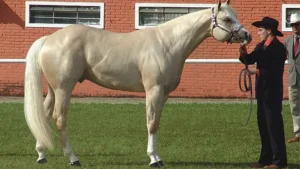


Leave your comment